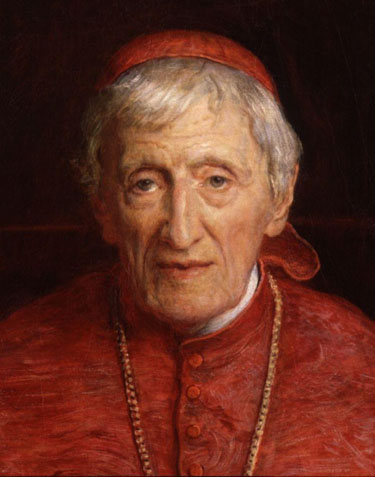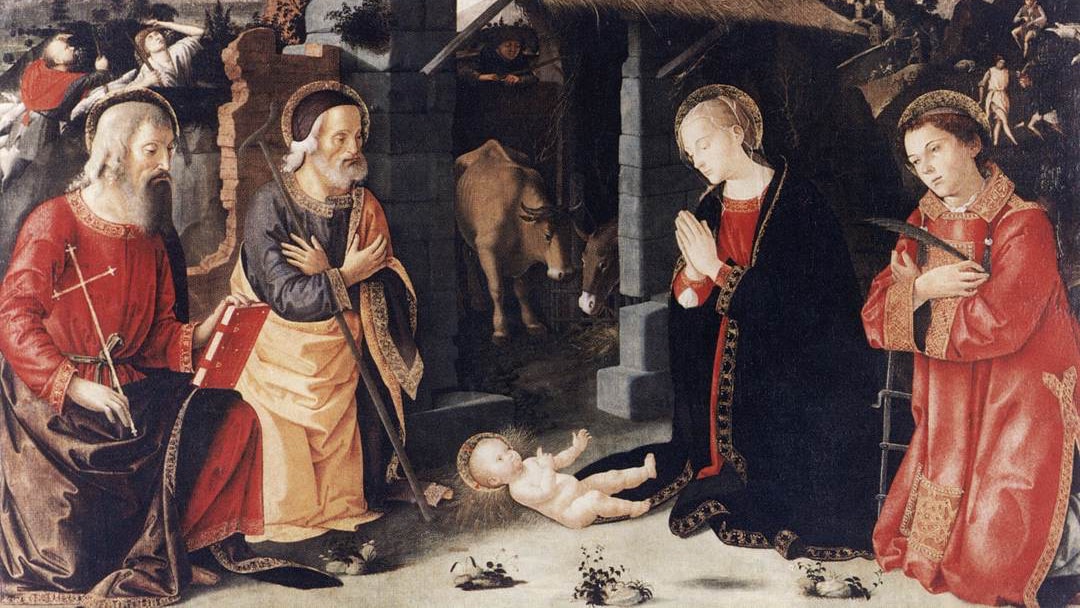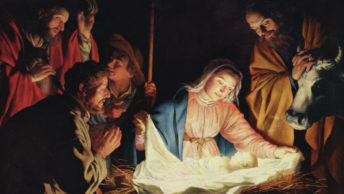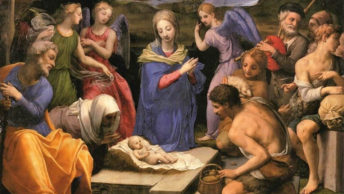
This is the time of Christmas parties — all sorts of Christmas parties. What, we might ask, are they celebrating? In whose honor are these parties given? Picture yourself at such a party and asking people if they’re partying because of the birth Jesus Christ. Can you imagine the stares you would receive? Many are there simply to celebrate “The Holidays.”
Our Gospel reading today is about a party. We might even call it the First Christmas Party. It wasn’t big or elaborate. No caterer was present. Waiters and waitresses weren’t slipping through the crowd with silver trays bearing long-stemmed champagne glasses. No, it wasn’t a party like that.
There were just two women there, both celebrating their rather strange pregnancies. Elizabeth was old, until recently thought to be sterile. Mary was a virgin, half girl and half woman, who was carrying a child resulting from the strangest of all pregnancies. Neither one of them lived with anywhere near the level of comforts we have. Yet they were absolutely bursting with excitement. John the Baptist was even leaping in his mother’s womb.
What is critical is the way we see this picture, this tableau. And this is true, of course, anytime we read any gospel account, when we look into the picture any Gospel passage is presenting to us. Perhaps it true even more so here, in this account we just heard.
The important question has to do with the realm in which we locate this event. What questions should we be asking ourselves as we peer into this picture that’s being placed before us? The big question that we should be asking ourselves is this: What is God doing? Where is God in all of this? What’s He up to?
Mary and Elizabeth both saw themselves as willing instruments in the hands of God. They both knew that even though they didn’t fully understand the “how” or the “what” of God’s activities He was at work in their lives. They aware of the fact that throughout their lives He was advancing His purposes in our world.
Do we know that? Do we ever ask ourselves those questions? Let me repeat them. “Where is God in all of this? What is God up to in these things that are happening to me? What is God doing with my life here on earth?”
You see, the problem is that we have no difficulty in saying that we believe in God. Nor do I doubt the sincerity of faith in those who state that they believe in God. But most of us (and all too often I have to include myself in that number) are downright surprised when we discover God is actually doing something in our lives and with our lives.
Most of us, and we see this especially at Christmas parties, are practical atheists. What I mean by that is to say that in practice we live and move and act as if God really isn’t there, as if God isn’t present and acting in our daily lives. For all practical purposes we might as well admit that we act as if God has taken a temporary leave of absence. Rarely do we advert to His presence and His power in things that happen to us, or in the things that we plan to do, or choose to do. Nor do we ever, or hardly ever, tell ourselves or tell others, that we’ve seen God doing this or that or the other thing in our lives.
When we see a solution to a problem we congratulate ourselves on how smart we are and how competent we are. When we see no solution to our problems we sometimes plunge ourselves into despair. Some thereupon blame God for their problems. When we have enough money and people to do a job well, we promote ourselves to being the next chief executive officer. When there’s a shortage of money and personnel, we turn bitter, cynical, and defeatist.
Mary and Elizabeth found God present and active in their wombs and in their lives. They knew He was at work in them; they knew that in their lives He was accomplishing His and advancing His plans.
Which is not to say that their lives would be easy, or filled with happiness. No, quite the contrary. Elizabeth would see her son’s head delivered on a platter by a little girl, Salome, delivered to a besotted king Herod during a party that was little more than a drunken orgy. Not only that, but little Salome would be bringing John’s the Baptist’s head into the party on a platter because her mother asked her to!
Elizabeth, this very same celebrating Elizabeth we see in today’s Gospel account, would have to witness that scene and bear that in her memory forever. Can you imagine any mother having to see her son’s head delivered up on a silver platter during a drunken orgy? The word “pain” collapses under the weight of such an enormity. And Mary, the mother of Jesus, the other celebrating woman at that first Christmas party? Can you imagine the pain that she, too, had to endure? What mother is forced to see her son die in tortured agony?
Today is the fourth and final Sunday of Advent, the last before Christmas. Mary, Elizabeth, Joseph, shepherds, Wise Men, and all of the other characters in the scene are in front of us. God has come to them … and in coming to them He has come to us in our lives.
“Where’s God in all that’s happening in my life?” “What is God up to in these things that are happening to me?” “What is God trying to accomplish in all of this?” Mary and Elizabeth’s little party isn’t something that’s simply “nice”, a lovely little vignette 2,000 years distant from you and from me. Oh, no. Mary and Elizabeth’s meeting was all about their recognition that God was at work in their wombs and in their lives and that the world was going to be different because of their sons.
How do we see the tableaux of our lives? And what do we see in the picture that the events in our lives have painted? Where is God in all of this? The answer, as we all know, is not always that clear to us.
Back in the late 1800’s John Henry Cardinal Newman was an Anglican priest who later became a Catholic priest and was later made a Cardinal of the Church by Pope Leo XIII. Early in his journey through life Newman wrestled with the question of what God was doing with his life. Newman wrote a prayer about that and I want to share it with you now.
“God has created me to do Him some definite service; He has committed some work to me which He has not committed to another. I have my mission – I many never know it in this life, but I shall be told it in the next. I am a link in a chain, a bond of connection between persons. He has not created me for naught. I shall do good, I shall do His work. I shall be an angel of peace, a preacher of truth in my own place while not intending it- if I do but keep His commandments.Therefore I will trust Him, whatever, wherever I am. I can never be thrown away. If I am in sickness, my sickness may serve Him; in perplexity, my perplexity may serve Him; If I am in sorrow, my sorrow may serve Him. He does nothing in vain. He knows what He is about. He may take away my friends; He may throw me among strangers. He may make me feel desolate, make my spirits sink, hide my future from me – still He knows what He is about.”
When all is said and done we all struggle, no matter what our station in life may be, with questions about the meaning and purpose of our lives. Ultimately the answer is a matter of faith, something we must leave in the hands of God. But whether or not we have an answer is not really important. What is important, and what is central to everything, is that we have faith, faith in which we place ourselves and our lives into the hands of God who loves us, knowing that, as Cardinal Newman said, God knows what He is about.








